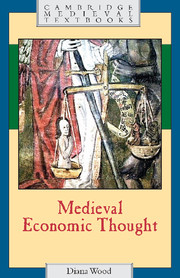Book contents
- Frontmatter
- Contents
- Preface
- List of abbreviations
- Introduction: problems, evidence, and background
- 1 Private property versus communal rights: the conflict of two laws
- 2 Wealth, beggary, and sufficiency
- 3 What is money?
- 4 Sovereign concerns: weights, measures, and coinage
- 5 The mercantile system
- 6 The just price and the just wage
- 7 The nature of usury: the usurer as winner
- 8 The theory of interest: the usurer as loser
- Conclusion
- Appendix: Notes on the main writers and anonymous works mentioned in the text
- Glossary of terms
- Select bibliography
- Index
- Cambridge Medieval Textbooks
2 - Wealth, beggary, and sufficiency
Published online by Cambridge University Press: 05 June 2012
- Frontmatter
- Contents
- Preface
- List of abbreviations
- Introduction: problems, evidence, and background
- 1 Private property versus communal rights: the conflict of two laws
- 2 Wealth, beggary, and sufficiency
- 3 What is money?
- 4 Sovereign concerns: weights, measures, and coinage
- 5 The mercantile system
- 6 The just price and the just wage
- 7 The nature of usury: the usurer as winner
- 8 The theory of interest: the usurer as loser
- Conclusion
- Appendix: Notes on the main writers and anonymous works mentioned in the text
- Glossary of terms
- Select bibliography
- Index
- Cambridge Medieval Textbooks
Summary
INTRODUCTION: RECIPROCITY AND THE MEAN
‘Wealth and beggary are two extremes. The mean is sufficiency’, declared Jean de Meun in the thirteenth-century French epic poem The Romance of the Rose. This mean dictated the balancing of resources between haves and have-nots as a matter of justice. It also controlled the workings of charity, as almsgiving became more discriminatory and individuals tried to maintain their own status and to ensure that those beneath them maintained theirs.
Almsgiving and works of mercy assumed a society of unequals, in which charitable acts might help to redress the balance or make life fairer, either by redistributing material resources or by alleviating suffering. But everything had its price, and charity was no exception. Pious benefactors expected something in return for their benevolence, usually in the form of prayers for their salvation. The mentality of gift exchange and barter was never far below the surface. Reciprocity was closely linked with charity; rich and poor were bound together in a relationship of mutual, if hostile, necessity. Pauper, in Dives and Pauper, delivered a sermon on the Augustinian theme of ‘The rich man and the poor be two things well needful each to other. And the rich man hath more need of the poor man's help than the poor of the rich.’ Inequality and reciprocity were part of the divine plan.
- Type
- Chapter
- Information
- Medieval Economic Thought , pp. 42 - 68Publisher: Cambridge University PressPrint publication year: 2002
- 1
- Cited by



